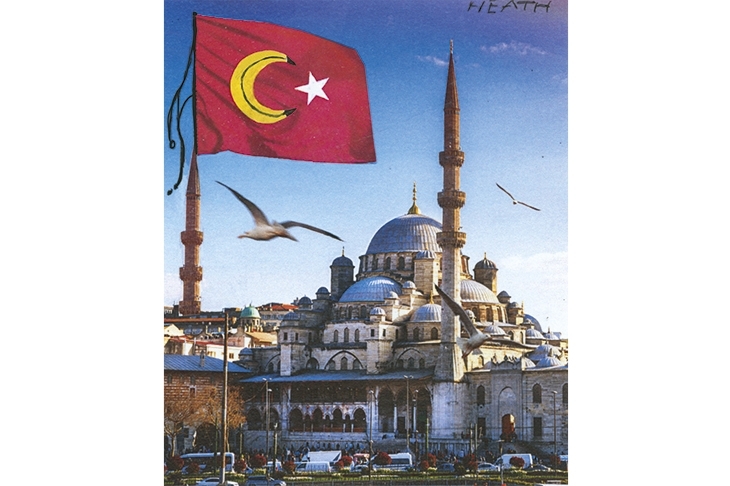On Thursday, Turkey Foreign Minister Mevlüt Çavuşoğlu will land in Brussels to meet with European Union officials to start to ‘build Turkey’s future in Europe’. Next week, Turkey is expected to resume talks with Greece to resolve their maritime disputes after a five-year hiatus. The clash in the eastern Mediterranean between Ankara and Athens has brought the two states to the brink of war and is one of a long list of reasons why Turkey has so far failed to ‘build’ that ‘future in Europe’.
Speaking to the European Commission President Ursula von der Leyen earlier this month, Erdogan vowed to ‘turn a new page’ in relations with the EU, expressing his desire for an update to the 2016 migration deal, which saw visa relaxations for Turkish citizens and £2.7 billion in EU funding. In return, Turkey halted the flow of migrants heading for Europe.
The EU isn’t the only front where Turkey is hinting at, if not diplomatic revisionism, then at least renewed opportunism. Washington has joined Brussels in wielding the sanctions stick against Ankara over its Mediterranean adventurism. The US has penalised Ankara for purchasing the Russian S-400 missile defence systems while removing US made F-35 jet from its arsenal (Turkey is, still, a member of Nato). Erdogan is already wooing the incoming Joe Biden regime with aspirations of a potential reversal of those sanctions.
Erdogan has gone from claiming Europe is on the brink of a Muslim genocide to talking up Turkey’s ‘deserved’ membership of the ‘EU family’
Israel, too, has enjoyed renewed attention from Erdogan, with whom the Turkish President now wants ‘better ties’ — last month he reappointed an ambassador to the country after two years’ absence. This came almost immediately after having threatened the UAE over its deal with Israel. The UAE, of course, has backed Greece’s claims in the Mediterranean and is now conducting joint naval exercises with Athens.
A couple of months after having dubbed Emmanuel Macron ‘mentally unstable’ over his response to the beheading of Samuel Paty, the Turkish President now wants to ‘save relations with France’. Macron has been the EU’s chief proponent of sanctions against Turkey — in return, Erdogan had been cheering on a boycott of French goods across the Islamic world, ostensibly a response to Macron’s crackdown on extremism. More than any personal jibes, or the supposed concern for French Muslims, it is the conflict of interests in Libya, Syria and the Eastern Mediterranean that encouraged Erdogan to go gung-ho against his French counterpart. But now Erdogan has gone from claiming Europe is on the brink of a Muslim genocide to talking up Turkey’s ‘deserved’ membership of the ‘EU family’ within just a couple of months.
This preposterous suggestion of common values while deeming counter-Islamist crackdowns worthier of outrage than Islamist beheadings underlines the grand paradox of Erdogan’s ambitions. He appears to be simultaneously seeking the establishment of both Turkey as an EU member state and hankering after a neo-Ottoman empire.
The latter is best symbolised by Turkey reconverting the Hagia Sophia from a museum into a mosque last year and the seizing of churches, many of which have now been converted into mosques. Erdogan’s persecution of Christians at home has been coupled with his bleating over ‘Islamophobia’ in the West. He has made clear he deems satire of Islam and counter-jihadist measures (also prevalent in many Muslim countries) as being akin to Nazi lynchings. Such language plays both to Erdogan’s conservative Islamic base at home as well as traditionalists abroad, bolstering Turkey’s position as the leader of a muscular, anti-Western Islamic world.
Yet Turkey’s neo-Ottoman vision and presence in the European Union shouldn’t necessarily be seen as contradictory. In fact, Turkish secularism — ironically, moulded on French Laïcité — was once touted by progressives as a model to follow for the Muslim world. However, the Erdogan-led metamorphosis of Turkey and religionist riling up of global Muslims leaves little doubt over his Islamist goals.
Those ambitions also seep through his duplicitous dealings with the EU. From opening the gates for migrants heading into Europe to facilitating jihadists in Syria and Iraq, much of the counterterror co-operation that Erdogan is vying to sell the EU boils down to Turkish military actions designed to safeguard its own interests, often at the expense of the Kurds. Turkish membership of the EU (however far-fetched that proposition now is) would merely be an extension of the same approach. Brussels would be just another theatre in which Turkish interests could be exercised.
If Erdogan is forced to choose between better relations with the West or his neo-Ottomanism, that decision was already made years ago. His attempts to achieve the former is really just a desire to stabilize the latter. Erdogan needs some respite from existing sanctions amid a crippling economic crisis at home. There is the possibility of fresh eyes over which to pull the wool in the case of Biden — or at least a need to test the waters with the incoming US President.
It would not, therefore, be a surprise if after the immediate threat of sanctions had passed and the Biden administration is settled and its Middle East policy decided on, that Erdogan returns to his cause, attacking Europe and besmirching the West.






Comments